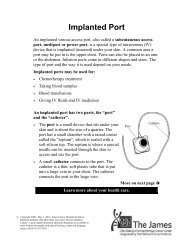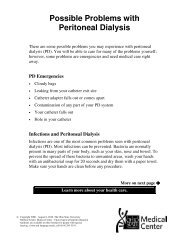Blood Tests for Dialysis - Patient Education Home
Blood Tests for Dialysis - Patient Education Home
Blood Tests for Dialysis - Patient Education Home
You also want an ePaper? Increase the reach of your titles
YUMPU automatically turns print PDFs into web optimized ePapers that Google loves.
Page 4<br />
Parathyroid Hormone (PTH)<br />
Healthy <strong>Dialysis</strong> average: 150 – 300 pg/mL<br />
Parathyroid hormone is important <strong>for</strong> controlling the amount of<br />
calcium in the body. It is part of a cycle that also helps to regulate<br />
Vitamin D, phosphorus and magnesium. When calcium is low in<br />
the blood, PTH hormone is released to take calcium from your<br />
bones. Vitamin D increases in the kidney to increase the absorption<br />
of calcium, and PTH speeds up the amount of phosphorous leaving<br />
the body. This helps you to have the right balance of phosphorous<br />
and calcium. Once calcium levels increase in the blood, PTH<br />
decreases. When on dialysis, taking too much calcium from the<br />
bones can lead to bone weakness. It is important to work with your<br />
dietitian to help you get enough calcium in your diet.<br />
Bicarbonate (Bicarb or Total C02)<br />
Healthy <strong>Dialysis</strong> average: 20 – 30 mmol/L<br />
Bicarbonate tests the amount of total carbon dioxide in the blood.<br />
Bicarbonate enters and exits your kidneys to keep your body’s<br />
electrolytes, such as salt, chlorine and potassium, in balance. If<br />
your levels are too high, you may have swelling in your arms and<br />
legs.<br />
Talk to your doctor or others on your health care team if you<br />
have questions. You may request more written in<strong>for</strong>mation<br />
from the Library <strong>for</strong> Health In<strong>for</strong>mation at (614) 293-3707 or<br />
email: health-info@osu.edu.
















